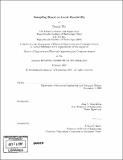Sampling based on local bandwidth
Author(s)
Wei, Dennis
DownloadFull printable version (7.767Mb)
Other Contributors
Massachusetts Institute of Technology. Dept. of Electrical Engineering and Computer Science.
Advisor
Alan V. Oppenheim.
Terms of use
Metadata
Show full item recordAbstract
The sampling of continuous-time signals based on local bandwidth is considered in this thesis. In an intuitive sense, local bandwidth refers to the rate at which a signal varies locally. One would expect that signals should be sampled at a higher rate in regions of higher local bandwidth, and at a lower rate in regions of lower local bandwidth. In many cases, sampling signals based on local bandwidth can yield more efficient representations as compared with conventional uniform sampling, which does not exploit local signal characteristics. In the first part of the thesis, a particular definition for a linear time-varying lowpass filter is adopted as a potential model for local bandwidth. A sampling and reconstruction method permitting consistent resampling is developed for signals generated by such filters. The method does not generally result in perfect reconstruction except for a special class of self-similar signals. However, the reconstruction error is shown to decrease with the variation in the cut-off frequency of the filter. In the second part of the thesis, a definition for local bandwidth based on the time-warping of globally bandlimited signals is reviewed. Using this definition, a method is developed for sampling and reconstructing signals according to local bandwidth. The method employs a time-warping to minimize the energy of a signal above a given maximum frequency. A number of techniques for determining the optimal time-warping are examined.
Description
Thesis (M. Eng.)--Massachusetts Institute of Technology, Dept. of Electrical Engineering and Computer Science, 2007. Includes bibliographical references (p. 105-106).
Date issued
2007Department
Massachusetts Institute of Technology. Department of Electrical Engineering and Computer SciencePublisher
Massachusetts Institute of Technology
Keywords
Electrical Engineering and Computer Science.